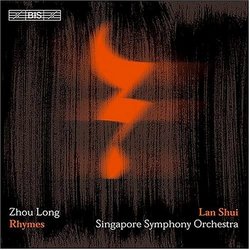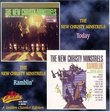| All Artists: Long Zhou, Lan Shui, Singapore Symphony Orchestra Title: Zhou Long: Rhymes Members Wishing: 2 Total Copies: 0 Label: Bis Release Date: 9/28/2004 Album Type: Import Genre: Classical Styles: Opera & Classical Vocal, Forms & Genres, Concertos, Symphonies Number of Discs: 1 SwapaCD Credits: 1 UPCs: 675754764128, 7318590013229 |
Search - Long Zhou, Lan Shui, Singapore Symphony Orchestra :: Zhou Long: Rhymes
 | Long Zhou, Lan Shui, Singapore Symphony Orchestra Zhou Long: Rhymes Genre: Classical
|
Larger Image |
CD DetailsSimilar CDs
|
CD ReviewsEast/West Ancient/Modern Fusion Dr. Christopher Coleman | HONG KONG | 10/03/2004 (4 out of 5 stars) "Zhou Long is one of a number of Chinese composers who have left their homeland to settle in America, but who retain emotional, spiritual and musical ties with their roots. Now based in Kansas City, Zhou and his wife Chen Yi are to me the most interesting of this group, which includes the more well-known composer Tan Dun. Zhou's life encompassed both the tragedy of the Cultural Revolution (in his teenage years he was sent to work on a farm and injured his back, according to the liner notes) and the success of international recognition; his music ranges as widely. It's not only the blend of Eastern tradtions and Western Avante-guard that makes his music so interesting, it's also the rich emotional variety it contains. Listening to the last movement from his Poems from the Tang for string quartet and orchestra, for example, you can see the immediate appeal. This movement is titled Song of Eight Unruly Tipsy Poets-you'll hear the tone painting as after a climactic moment the string quartet portrays the drunken poets stumbling over their own feet by playing pizzicato glissandi-plucking the string and bending the pitch, and all the while losing the tempo completely; by the end our Tipsy Poets have passed out! This is a terrific example of some of Zhou's more accessible work-the unmistakable Chinese influence seems to temper the avante-guard techniques some listeners find so unapproachable.
In the next two works on the CD, Chinese drumming is the inspiration. Da Qu is a concerto for percussion and orchestra flavoured with Chinese drums and melodies. It's not all banging; the opening of the first movement is quite introspective. His work The Rhyme of Taigu takes its title from the ancient art of Chinese drumming, which was later adopted by the Japanese as taiko drumming. The first movement does indeed presents lots of literal drumming. But I'm more interested in the final movement of this work, where the percussive idea has become translated into a repetitive pattern in the winds and strings. There are moments where Long's debt to Stravinsky, especially The Rite of Spring become overt. Some people might find the similarities a bit too close for aesthetic purity--personally I love The Rite and have always been surprised that more composers haven't been picking fruit off that particular tree more often. The final work on the CD, The Future of Fire, is a short piece with wordless choir added to the orchestra. It's effective, for sure, but to my mind attempts less than the other works. I must also note the wonderful playing of the Singapore Symphony orchestra, directed by Lan Shui. It's a terrific performance, with sparkling brass and percussion, lush winds and strings, great attention to balance and detail." |

 Track Listings (11) - Disc #1
Track Listings (11) - Disc #1

